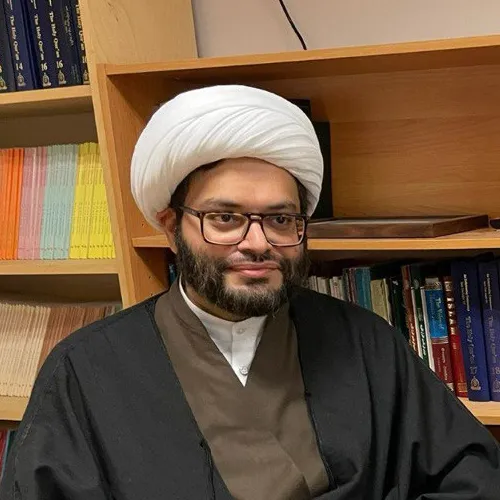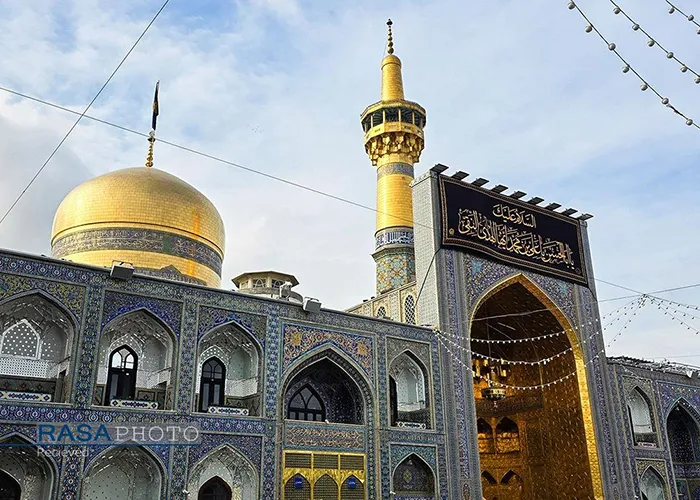Hajj Mohammad Javad Mirza
Hajj Mohammad Javad Mirza is another young Friday Imam in England who has been a guest in our Friday Bulletin. When we met him, he was among a group of young people, who were surrounding him.
When we learned about his family background, we asked him to give us more information about how he came from a prominent family interested in spirituality and efforts to spread religion.
- Haj Agha, I heard that you are from a very old and noble family, can you introduce yourself briefly, and how did you choose this path?
During the era of King Abdullah Qutub Shah, my ninth great-father, Mirza Aslaan Baig Khan, emigrated from Iran to Hyderabad, India. He was a member of one of the prominent families who devoted their lives to establish Imam Husain’s Azaa in India, many of his descendants went on to become well-known poets, most notably Mirza Gulam-e-Sajjad Ashhar, who used his eloquence to spread the message of Ashura, Poetry was at its peak during his time, and the poets of Aal-e-Ashar rose to fame.
With such a family Islamic heritage, I was privileged to begin Hawza studies in India at the age of 12, and then moved to Qum to complete higher studies when I was 19, In 2006 and 2007, I was invited to give lectures in London, and due to the necessity of Tabliqh, I eventually became the Resident Alim and remained in the UK permanently.
- Introduce your Friday prayer?
The origins of Islamic centres in east London date back to the 1980s, The majority of the migrants in the area had Friday prayers in Islamic centres, but they were primarily in Urdu, In order to reach the youth and bring together a multi-cultural society, a centre that was accessible to all in English was needed, so a group of young believers got together with the help of Ulama to create a new Islamic centre, MCE in 2009. Friday prayer was started in 2009, and I have been with MCE leading Friday prayers since 2011, Our goal is to serve believers of all ethnic backgrounds, and Alhamdolillah, we have brothers and sisters from India, Pakistan, Iran, Afghanistan, African countries and many Arab countries attending our congregation.
- Describe the most recent challenge you experienced during Friday prayer and how you resolved it?
We face multiple challenges, for instance, some Muslims in the West, particularly those who have immigrated, are reluctant to share their Islamic beliefs because of the distinct culture and society they live in.
In this case, we try to educate Muslims in the West to discuss their beliefs using evidence that others can understand, for instance, when it comes to drinking alcohol, a Muslim should first explain the social and medical consequences to help someone understand why Islam forbids using intoxicants, I recall that once, a non-Muslim asked me about Jizya of Kafir-e-Zimmi (a tax on non-Muslims who reside in Islamic countries), and he found the tax unacceptable.
I explained to him that in Islamic countries, Muslims pay Zakat and Khums as Islamic taxes, whereas non-Muslims are not required to pay Khums and Zakat because it is an obligatory tax on Muslims, As a result, Islam developed the Jizya tax for individuals who live in Islamic countries and are exempt from paying other forms of taxes, in exchange, the government is obligated to provide non-Muslims with the same level of safety and services as Muslims.
- How do you counsel a young Muslim who desire to wed a non-Muslim? Please mention the notes and be specific.
We usually advise our young people to marry someone who is compatible with them in terms of age, religion, race, and culture because marriage is a significant part of life and a lifetime commitment. Such compatibility brings a great deal of understanding into a marital existence, otherwise, they may face challenges, problems in future.
On the other hand there is always an opportunity for non-Muslims to convert to Islam, In the early days of Islam, many non-Muslims who voluntarily accepted the faith later married Muslims, For this reason, if a Muslim brother or sister chooses to marry a non-Muslim, we offer Islam to the other person and, if they agree willingly, we perform an Islamic marriage.
To become practicing Muslims, we continually encourage new Muslims to join our mosques and learn about Islamic teachings and culture. We provide them with educational literature and help them obtain a thorough understanding of Islam.
- For what reasons does a mosque or Islamic centre fail to draw the interest of young people and believers?
Islamic centres should create courses that are compatible with the European educational system and can be taught using the most up-to-date academic teaching methods.This is because preaching in Islamic centres using eastern methods can be unsuccessful in the Europe, and if the scholar is unable to fully understand the nature or root cause of the youth’s problem, he will not be able to inspire young people to Islamic centres.
- What changes should the Friday congregation’s Imam make, and how can he improve the programs’ attraction and participation rates? Could you please provide an example?
There are numerous strategies for attracting believers to programs:
- Setting up meetings so that Momenin can visit and talk about their issues.
For example, Islamic centres should find community experts to come forward and offer their guidance regarding general well-being. Our Prophet used to resolve Muslim issues from the mosque, so if a Momin realises that there is much to gain from Islamic centres and the centre is able to address and solve their issues, he will always be attached to the mosque and participate. Every centre should have a department that can provide guidance on a variety of issues, including educational guidance, marital guidance, medical guidance, and many more. - The Centre management and scholars should demonstrate humility and compassion to participants and strive for a positive connection. Sometimes Momenin turn away from centres because they were not welcomed. In Iran, India, and Pakistan, it is traditional for the organisers to stand on the door to greet Momenin during a Majlis, this practice can be used in Europe to honour the participants, and it is certain that such humbleness will draw them to the mosques.
- I feel that involving youngsters in management of Islamic centres can bring fresh ideas and help the centre evolve with the demands of each decade, However, some facilities are governed by elderly management without their engagement.
- Centres could plan visits for youngsters to spiritual historical sites and natural sights. As Islam promotes travel, such trips can strengthen ties between believers and centres.
editor's pick
news via inbox
Subscribe to the newsletter.




